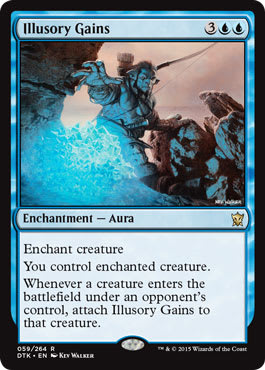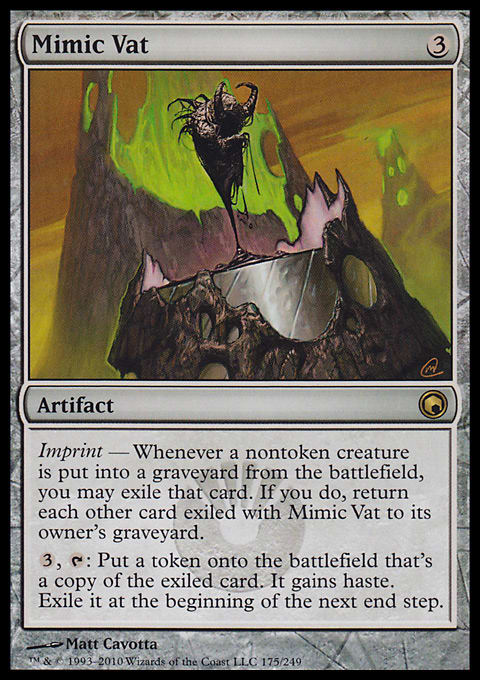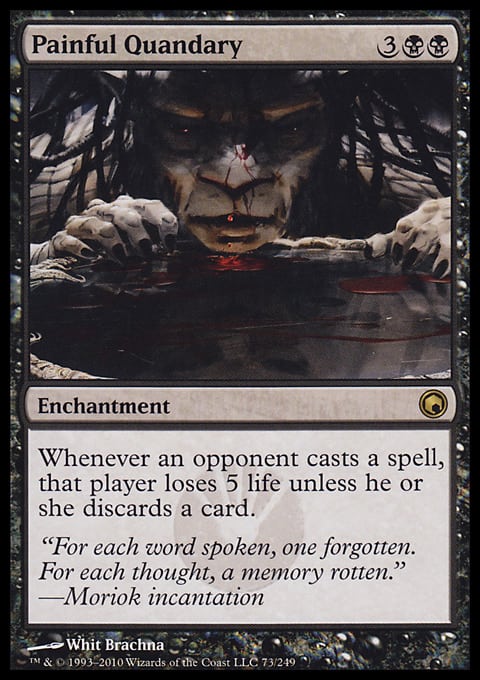With a title like that, the article itself can only disappoint, but you’re hooked now, so let’s go.
I had a game ‘last night’ 1 that was totally dominated by a card that most players would dismiss as innocuous — if not outright awful. That got me thinking about a class of cards that doesn’t get talked about much. By ‘mind-altering substances,’ I mean cards (usually permanents) that have long-term effects on multiple elements of play. More specifically, they add an additional complication to a common action or decision, such as playing a creature. The question is, how much of an advantage can you get from messing with everyone’s plans? At the end of the article I’ve put together a decklist that might help answer that.
The card ‘last week’ was a borderline piece of crap called Illusory Gains. On the surface, it is much worse than Control Magic, which is 1 mana cheaper and allows you to target and hold on to the best creature on the board. With Illusory Gains, you can steal that Consuming Aberration temporarily, but if someone makes a goat token then you lose control of the game-ending monstrosity and are stuck with an enchanted goat. In theory, Illusory Gains gives your opponents a lot of control over what creature you get and when you get it, and giving opponents control is generally a bad idea. 2
But give that card another read and think about what it does to a multiplayer game.
What actually happened is that Kevin played Illusory Gains, and everyone struggled to take account of it as they played spells and tried to plan ahead. You could never know what creature Kevin would have next turn, and you couldn’t be sure if you would ever get to use whatever creatures you cast. If Kevin was enchanting Tony’s creature and I cast my first creature, then I lose my creature and Tony gets his creature back (so I have no dudes, and Tony and Kevin can attack me at will).
The confusion wrought by this single card was so total that even Kevin was caught up in it; he was doing so much damage with his first copy of Illusory Gains that he copied it, stealing another creature. Of course, he didn’t realize that as soon as another creature came into play, it was enchanted with both copies of Illusory Gains, negating the effect of the second card.
In short: wacky card played, chaos ensues.
Some of the chaos that cards like this cause can be explained by the fact that we are Bad At Magic.TM After all, it was a permanent, predictable effect that can be understood with a rudimentary knowledge of Magic timing rules. But multiplayer Magic is so complex that eventually most of us just get overloaded, and we can't process all of the known information. Mind-altering substances like Illusory Gains just make it so much easier for your opponents (and you) to get overloaded, because it adds an extra hurdle to something that we all take for granted, and when we forget, the effects can be huge.
Class A Control Substances
I've been thinking about this since Scars of Mirrodin, when two cards in particular, Nim Deathmantle and Mimic Vat, were just transforming game after game. With a Deathmantle in every deck, most of my games went like this: “Oh, you kill my Angel of Despair? I’ll just pay 4 mana, bring her back as a 7/7, and smite your strongest permanent to punish your perfidy.” Time after time I did that, and my opponents never caught on. Some of the guys I played with in Tokyo were even moderately intelligent, but they kept overlooking my Deathmantle. It just seemed that the effect was too hard to factor into every decision, and I won a lot of games taking advantage of their confusion. 3
I think people were just too used to standard lines of play: target the strongest creature with your removal, sweep the board when your relative board position is too weak, attack into a creature that you want to kill, and so on. Every time they made what used to be the right decision, I tapped four mana and it became the wrong decision.
Mimic Vat was even worse. Any time they killed anything, they had to worry about what I was going to do with it. Sometimes they let their own dude die hoping to reanimate it, but I exiled it for just long enough that they couldn’t. Sometimes they killed a game-ending monstrosity only to realize that I now had that monstrosity on a stick, and mine had haste. And remember, this was back before Primeval Titan was banned; Four lands for three mana? Don’t mind if I do!
For a similar effect, think about a card like Propaganda and how they overload your opponents’ ability to comprehend the board state. How many times have you seen someone tap out, maybe to play a hasty creature, and then try to attack someone with Propaganda, only to realize that they can’t pay the tax? Complexity is one of the defining characteristics of multiplayer Magic, but some cards take things to the next level by adding new complications to ‘normal’ actions and decisions that we make every round.
This presents the multiplayer strategist with an opportunity and a challenge: if you can turn your opponents’ expectations on their head so that they can't make smart decisions, you’ve got a much better chance of winning, but if you can't keep track of things better than everyone else, you’ll get caught up in the chaos and lose your edge.
Ordering the Chaos
Let’s look at the basic phases and actions of the game, and some cards that can mess with them:
Untap Phase:
- Untapping permanents — Dream Tides, Hokori, Dust Drinker, 4 Meekstone, Mist of Stagnation, Static Orb, Storage Matrix
Upkeep Phase:
- No actions commonly taken but you can add costs and effects with cards like Magus of the Abyss (discussed recently), Noetic Scales (perfect for a discard deck!), Sands of Time, Teferi's Realm, Umbilicus
Draw Phase:
- Drawing cards (you're welcome!) — Anvil of Bogardan, Chains of Mephistopheles (no proxies, please), Phyrexian Tyranny, Teferi's Puzzle Box
Main Phase:
- Anything at all — Fatespinner
- Playing lands — Frozen Aether, Land Equilibrium, Root Maze, Thalia, Heretic Cathar
- Tapping lands — Manabarbs, Mana Web, Storm Cauldron, War's Toll
- Casting spells — Damping Engine, Grip of Chaos, Hall of Gemstone, Jace, Unraveler of Secrets, Lurking Predators, Mana Maze, Oppression, Painful Quandary, Sphere of Resistance
- Playing creatures — Aether Flash, Blind Obedience, Spreading Plague
- Killing creatures — Athreos, God of Passage, Black Mike, Cauldron of Souls, Kira, Great Glass-Spinner, Lifeline, Marchesa, the Black Rose
Combat Step:
- Attacking — Angel's Trumpet, Boros Battleshaper, Caltrops, Dread, Silent Arbiter
- Blocking — Behind the Scenes, Death Pits of Rath, Lure, Siege Behemoth
End Step:
This is only a representative list, and I acknowledge it is hard to create a new category of cards that lumps all of these different effects together. On top of that, there is definitely a fine line between messing with people’s heads and just screwing them over. Smokestack doesn’t make the list because it primarily screws people over every upkeep, although you could easily make a case that it belongs. Instead I focused on cards like Noetic Scales, which doesn’t even destroy anything, but can easily turn your opponent’s cunning plan on its head.
In every case, these cards have a chance to put your opponents in a difficult position: if they forget about one of these cards, something they are planning to do — even something they must do to survive — will be impossible.
- You’re planning to cast that Damnation in your hand, but Teferi's Puzzle Box whisks it away before your main phase, leaving you with no answers to my threats
- You’re planning to play a creature to block the big dude that just hit the board, but you forget that it comes into play tapped thanks to Blind Obedience
- You tap out to play a big dragon, but you forget that the next player is also playing Red, and when they play any creature, Spreading Plague will destroy your dragon and leave you defenseless
- You were relying on your Maze of Ith to protect you from my big beater, but you forgot that Kira, Great Glass-Spinner will negate your first targeted effect
- You have 5 mana but you need 6 mana to play your sweeper, but you forget that it will come into play tapped because of Thalia, Heretic Cathar
With so much going on in any game, it is natural for all of us to overlook a key variable in our decision-making and make a mistake that leaves us vulnerable. I have a Marchesa, the Black Rose deck, so I know very well what she does and how to abuse her abilities, but when someone else played their Marchesa deck against me last week I kept forgetting about the return-to-play trigger. Again, partly this is just me being bad at Magic, but a big part of the power of cards like Marchesa comes from the way they confound your opponents’ expectations when they make (supposedly) simple decisions.
Chaos Controlled?
I just gave you a big list of cards that will turn the game on its head, frustrate your opponents, and cripple their ability to make strategic, long-term decisions. But none of that necessarily gets you closer to winning. Before we take that next step, let me talk about the elephant in the room: chaos decks. Some people build decks purely in order to mess with everything, and they have no particular plan to pull a win out of the huge pile of crap that they turn the game into. I’ve never advocated or enjoyed that play style, but if that's what floats your boat, then go for it.
What I’m talking about is setting up an asymmetric chaos that you can use to your advantage. Cards like Painful Quandary put your opponents on the back foot without hurting you. Cards like Oppression and Endless Whispers can be manipulated to that they harm you less than your opponents — for example I have a 60-card Oppression/Haakon, Stromgald Scourge deck that was happy to discard knights so that I could play them from my graveyard, and I suggested a deck to take the sting out of Endless Whispers here. Other mind-altering substances might only harm certain strategies, so you’ll be fine as long as you aren't playing that game. Instead of trying to draw as many cards as possible, like everyone else at your table, play a deck that thrives with an empty hand, and force your opponents to play on your terrain. It’s like a Magic version of Sun Tzu’s Art of War, but much meaner, and therefore much more fun.
In fact, this seems like so much fun I think I feel a decklist coming on.
Ob Nixilis, Unshackled ? Commander | Daryl Bockett
- Commander (1)
- 1 Ob Nixilis, Unshackled
- Mind-Altering Substances (18)
- 1 Archfiend of Depravity
- 1 Dictate of Erebos
- 1 Endless Whispers
- 1 Grave Betrayal
- 1 Grave Pact
- 1 Lethal Vapors
- 1 Mana Web
- 1 Mimic Vat
- 1 Nim Deathmantle
- 1 Noetic Scales
- 1 Oppression
- 1 Painful Quandary
- 1 Phyrexian Revoker
- 1 Pithing Needle
- 1 Portcullis
- 1 Spreading Plague
- 1 Teferi's Puzzle Box
- 1 Vedalken Orrery
- Draw/Tutor (9)
- 1 Beseech the Queen
- 1 Disciple of Bolas
- 1 Gonti, Lord of Luxury
- 1 Graveborn Muse
- 1 Greed
- 1 Harvester of Souls
- 1 Ob Nixilis Reignited
- 1 Phyrexian Arena
- 1 Sidisi, Undead Vizier
- Ramp (6)
- 1 Armillary Sphere
- 1 Burnished Hart
- 1 Jet Medallion
- 1 Liliana's Shade
- 1 Pilgrim's Eye
- 1 Twisted Abomination
- Recursion (4)
- 1 Elixir of Immortality
- 1 Magus of the Will
- 1 Phyrexian Reclamation
- 1 Sepulchral Primordial
- Removal (12)
- 1 Black Sun's Zenith
- 1 Consuming Vapors
- 1 Crux of Fate
- 1 Curtains' Call
- 1 Damnation
- 1 Deathbringer Regent
- 1 Innocent Blood
- 1 Pestilence Demon
- 1 Reiver Demon
- 1 Sever the Bloodline
- 1 Sudden Spoil
- 1 Toxic Deluge
- Life-gain (5)
- 1 Bloodchief Ascension
- 1 Gray Merchant of Asphodel
- 1 Shriveling Rot
- 1 Tribute to Hunger
- 1 Whip of Erebos
- Protection (7)
- 1 Creepy Doll
- 1 Darkness
- 1 Dread
- 1 Hissing Miasma
- 1 Lightning Greaves
- 1 Marchesa's Decree
- 1 Swiftfoot Boots
- Land (38)
- 38 Swamp
That right there is a whole lot of messing with people’s heads. I might have got a little carried away with the destruction and the head-messing and whatnot. If you are drawn to the dark side to make a deck like this, you might want a little less heartbreak and a little more graveyard removal . . . I could’ve sworn I left a Leyline of the Void and a Void Maw lying around somewhere.
Conclusion
Magic is the most complex strategic game on the planet. It makes three-dimensional chess look like . . . regular chess, or something. But how are your opponents going to outsmart you when they have an extra three triggers to worry about every time they look at your board? Keep your opponents off balance with your favorite mind-altering substances, and take advantage of their confusion, mistakes, and plaintive cries of heartrending despair.
1 Like any standup comic, I reserve the right to pretend that stuff happened as recently as I need it to.
2 This is the reason why Dash Hopes is crap. But like any theory it only goes so far, failing to explain why cards like Fact or Fiction and Steam Augury are good.
3 It didn’t hurt that I was able to pick up as many copies as I wanted for no more than 20 cents each. I was surprised to see that Mimic Vat costs $3 and Nim Deathmantle is sitting at $6. They're both worth the higher sticker price, although for what it’s worth I thought Mimic Vat should be more expensive than the Mantle, so pick ‘em up now if you haven't already.
4 I’m reluctant to introduce this to any Commander player who doesn’t already know it. My normally easy-going buddy Earl put together a horrifyingly effective Hokori deck that he used to teach combo players a lesson. Playing against it was like plumbing the depths of human misery, but without the untapping.

























